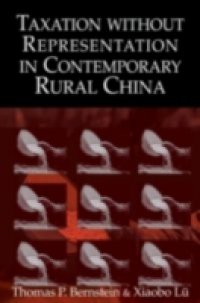The financial burden imposed upon the Chinese farmer by local taxes has become a major source of discontent in the Chinese countryside and a worrisome source of political and social instability for the Chinese government. Bernstein and Lu examine the forms and sources of heavy, informal taxation, and shed light on how peasants defend their interests by adopting strategies of collective resistance (both peaceful and violent). Bernstein and Lu also explain why the central government, while often siding with the peasants, has not been able to solve the burden problem by instituting a sound, reliable financial system in the countryside. While the regime has, to some extent, sought to empower farmers to defend their interests - by informing them about tax rules, expanding the legal system, and instituting village elections, for example, these attempts have not yet generated enough power from 'below' to counter powerful, local official agencies.

